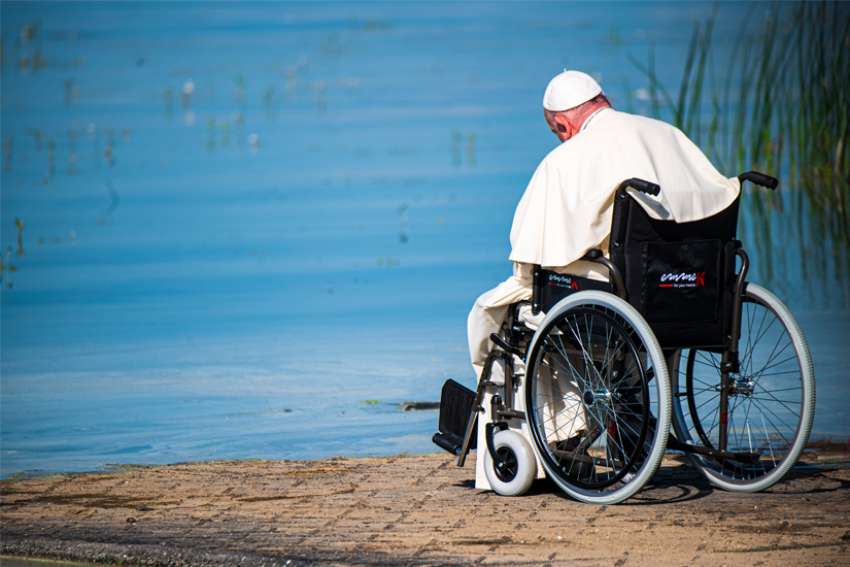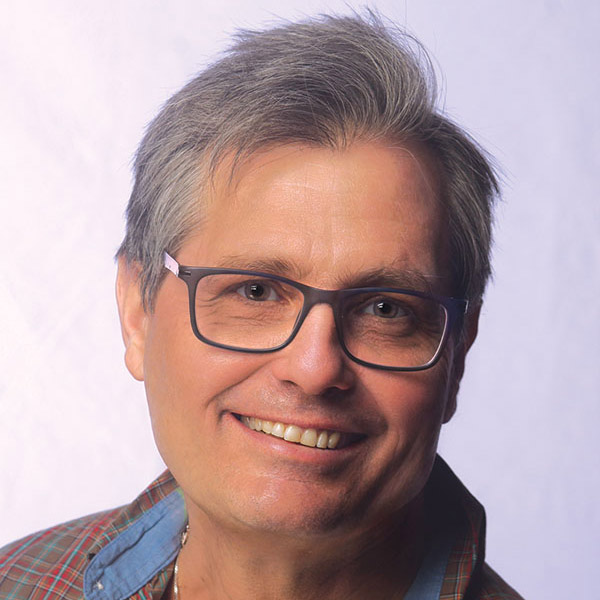Michael Swan
The Catholic Register
The Catholic Register was on scene with Pope Francis during his 'penitential pilgrimage' across Canada. See Michael's full reporting of the pope's historical visit.
Like generations of pilgrims before him, Pope Francis came to the water’s edge at Lac Ste. Anne seeking healing — not his healing, ours.
“This evening, let us picture ourselves around the lake with Jesus, as He draws near, bends down and with patience, compassion and tenderness, heals many who are sick in body or spirit: the possessed, the paralyzed, the blind and lepers, but also the broken-hearted and discouraged, the lost and hurting,” Francis urged the tightly packed crowd at the Lac Ste. Anne auditorium. “Jesus came then, and He still comes now, to care for us, and to console and heal our lonely and wearied human family.”
Francis himself appeared at first weary as he was rolled down to the lake in his wheelchair. But having prayed by the water, he seemed to gain new strength and even a sense of fun as he sprinkled the crowd with holy water on his way back from the lake to the auditorium.
Lac Ste. Anne, the second stop for the Pope on July 26 during his penitential pilgrimage to Canada to apologize for the Church’s role in residential schools, has long been a place of spiritual, cultural and social rejuvenation for Indigenous peoples. Since 1889, Indigenous have travelled to the lake in late July to celebrate the Feast of St. Anne, mother of Mary and grandmother of Jesus.
As has been his formula throughout this trip, the Pope did not urge some outside intervention to magically bring about reconciliation between Indigenous people and the Church and Canadians. Rather, he laid before Canadians the tools they already have — family, community, hope, faith and above all trust in Jesus.
“Jesus, who heals and consoles us with the living water of His Spirit, asks that from us too, from the hearts of those who believe in Him, ‘streams of living water might flow,’ ” he said.
He made the case that the Church should be a trusted partner in Canada’s search for reconciliation and the residential school survivors’ search for healing.
“I have come here as a pilgrim also to say to you how precious you are to me and to the Church. I want the Church to be intertwined with you, as tightly woven as the threads of the coloured bands that many of you wear,” he said. “May the Lord help us to move forward in the healing process, towards an ever more healthy and renewed future.”
See also:
As has been a theme throughout his penitential visit, Pope Francis urged healing across generations. He praised the role of grandmothers and mothers who pass on the mother tongue, culture and faith preserved in every family. He asked elders to make space for young people by listening to them.
“It is the muffled plea of young people who are more interrogated than listened to, who delegate their freedom to a cell phone, while in the same streets other young people wander about, lost, aimless, prey to addictions that only make them depressed and frustrated, unable to believe in themselves or to love themselves for who they are, or to appreciate the beauty of their lives,” said Francis.
It was not a message exclusively for Indigenous Canadians.
“All of us need the healing that comes from Jesus, the physician of souls and bodies,” he said. “Lord, as the people on the shores of the Sea of Galilee were not afraid to cry out to you with their needs, so we come to you this evening, with whatever pain we bear within us. We bring to you our weariness and our struggles, the wounds of the violence suffered by our Indigenous brothers and sisters.”



